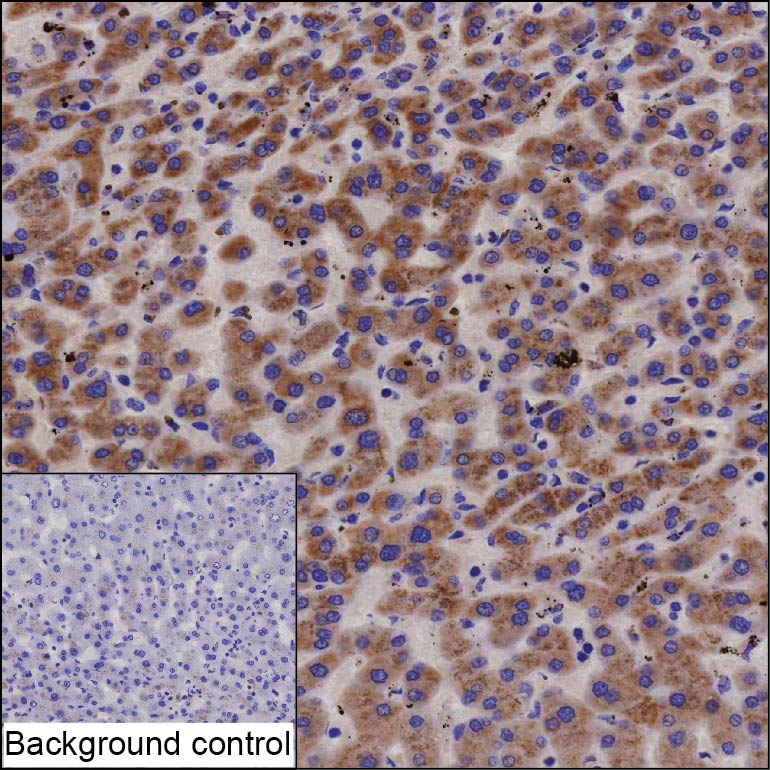
| WB | 咨询技术 | Human,Mouse,Rat |
| IF | 咨询技术 | Human,Mouse,Rat |
| IHC | 1/25-1/200 | Human,Mouse,Rat |
| ICC | 技术咨询 | Human,Mouse,Rat |
| FCM | 咨询技术 | Human,Mouse,Rat |
| Elisa | 咨询技术 | Human,Mouse,Rat |
| Host/Isotype | Mouse IgG2a |
| Antibody Type | Primary antibody |
| Storage | Store at 4°C short term. Aliquot and store at -20°C long term. Avoid freeze/thaw cycles. |
| Species Reactivity | Human |
| Immunogen | Purified recombinant fragment of human SENP8 |
| Formulation | Purified antibody in PBS with 0.05% sodium azide |
+ +
以下是关于SENP8抗体的3篇参考文献的简要概括:
---
1. **标题**: "DEN1 is a dual function protease responsible for processing and deconjugating the ubiquitin-like protein NEDD8"
**作者**: Gan-Erdene T. et al. (2003)
**摘要**: 本研究报道了SENP8(又称DEN1/NEDP1)作为特异性水解NEDD8的蛋白酶,开发了针对SENP8的多克隆抗体,并验证其在体外酶活性和细胞内NEDD8去结合反应中的作用。
2. **标题**: "Structural basis for specific cleavage of NEDD8 by SENP8"
**作者**: Reverter D. et al. (2005)
**摘要**: 通过晶体结构分析揭示SENP8识别NEDD8的分子机制,研究中利用特异性抗体进行免疫印迹实验,证实SENP8对NEDD8的底物选择性高于其他泛素样蛋白。
3. **标题**: "SENP8 regulates cell proliferation via modulating NEDD8 conjugation on cullin-RING ligases"
**作者**: Wu K. et al. (2011)
**摘要**: 探讨SENP8通过调控Cullin蛋白的NEDD8修饰影响细胞周期进程,使用商业化SENP8抗体进行敲低实验和Western blot分析,证明其功能与肿瘤生长相关。
---
注:若需更多文献,建议结合具体数据库(如PubMed或Google Scholar)以“SENP8 antibody”或“DEN1/NEDP1 antibody”为关键词进一步检索。
The SENP8 antibody is a crucial tool for studying SENP8 (Sentrin-specific protease 8), a member of the SUMO (Small Ubiquitin-like Modifier)-specific protease family. Unlike other SENP proteases (SENP1–7), SENP8 (also called DeSUMOylating Isopeptidase 1. DeSI-1) belongs to a distinct subfamily and primarily processes ubiquitin-like modifiers, including SUMO and NEDD8. It catalyzes the cleavage of precursor proteins to mature forms or removes these modifiers from conjugated targets, regulating processes like apoptosis, DNA repair, and stress responses. SENP8 features a conserved catalytic domain but differs structurally from other SENPs, lacking specific N-terminal extensions, which may influence substrate specificity.
SENP8 antibodies are typically developed to detect endogenous SENP8 in applications such as Western blotting, immunofluorescence, or immunoprecipitation. These antibodies target specific epitopes, often within the catalytic domain or unique regions of SENP8. ensuring minimal cross-reactivity with other SENP family members. Research using SENP8 antibodies has revealed its role in modulating pathways like NF-κB signaling and its interaction with proteins such as BCL-G, a pro-apoptotic factor. Dysregulation of SENP8 has been implicated in diseases, including cancer and neurodegeneration, highlighting its therapeutic potential. The antibody's specificity and reliability are critical for elucidating SENP8's precise biological functions and regulatory mechanisms.
×